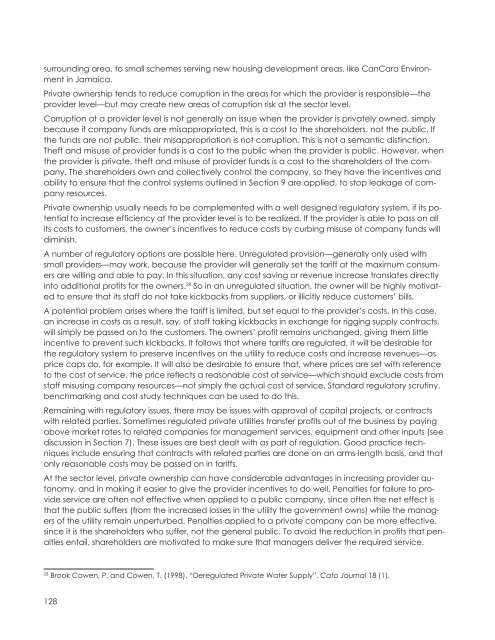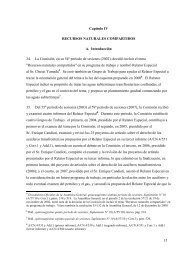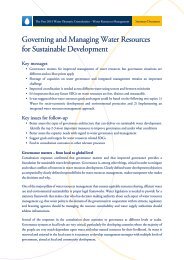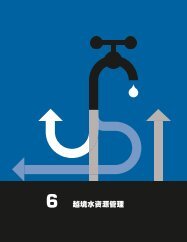A Sourcebook - UN-Water
A Sourcebook - UN-Water
A Sourcebook - UN-Water
Create successful ePaper yourself
Turn your PDF publications into a flip-book with our unique Google optimized e-Paper software.
surrounding area, to small schemes serving new housing development areas, like CanCara Environment<br />
in Jamaica.<br />
Private ownership tends to reduce corruption in the areas for which the provider is responsible—the<br />
provider level—but may create new areas of corruption risk at the sector level.<br />
Corruption at a provider level is not generally an issue when the provider is privately owned, simply<br />
because if company funds are misappropriated, this is a cost to the shareholders, not the public. If<br />
the funds are not public, their misappropriation is not corruption. This is not a semantic distinction.<br />
Theft and misuse of provider funds is a cost to the public when the provider is public. However, when<br />
the provider is private, theft and misuse of provider funds is a cost to the shareholders of the company.<br />
The shareholders own and collectively control the company, so they have the incentives and<br />
ability to ensure that the control systems outlined in Section 9 are applied, to stop leakage of company<br />
resources.<br />
Private ownership usually needs to be complemented with a well designed regulatory system, if its potential<br />
to increase efficiency at the provider level is to be realized. If the provider is able to pass on all<br />
its costs to customers, the owner’s incentives to reduce costs by curbing misuse of company funds will<br />
diminish.<br />
A number of regulatory options are possible here. Unregulated provision—generally only used with<br />
small providers—may work, because the provider will generally set the tariff at the maximum consumers<br />
are willing and able to pay. In this situation, any cost saving or revenue increase translates directly<br />
into additional profits for the owners. 28 So in an unregulated situation, the owner will be highly motivated<br />
to ensure that its staff do not take kickbacks from suppliers, or illicitly reduce customers’ bills.<br />
A potential problem arises where the tariff is limited, but set equal to the provider’s costs. In this case,<br />
an increase in costs as a result, say, of staff taking kickbacks in exchange for rigging supply contracts,<br />
will simply be passed on to the customers. The owners’ profit remains unchanged, giving them little<br />
incentive to prevent such kickbacks. It follows that where tariffs are regulated, it will be desirable for<br />
the regulatory system to preserve incentives on the utility to reduce costs and increase revenues—as<br />
price caps do, for example. It will also be desirable to ensure that, where prices are set with reference<br />
to the cost of service, the price reflects a reasonable cost of service—which should exclude costs from<br />
staff misusing company resources—not simply the actual cost of service. Standard regulatory scrutiny,<br />
benchmarking and cost study techniques can be used to do this.<br />
Remaining with regulatory issues, there may be issues with approval of capital projects, or contracts<br />
with related parties. Sometimes regulated private utilities transfer profits out of the business by paying<br />
above market rates to related companies for management services, equipment and other inputs (see<br />
discussion in Section 7). These issues are best dealt with as part of regulation. Good practice techniques<br />
include ensuring that contracts with related parties are done on an arms-length basis, and that<br />
only reasonable costs may be passed on in tariffs.<br />
At the sector level, private ownership can have considerable advantages in increasing provider autonomy,<br />
and in making it easier to give the provider incentives to do well. Penalties for failure to provide<br />
service are often not effective when applied to a public company, since often the net effect is<br />
that the public suffers (from the increased losses in the utility the government owns) while the managers<br />
of the utility remain unperturbed. Penalties applied to a private company can be more effective,<br />
since it is the shareholders who suffer, not the general public. To avoid the reduction in profits that penalties<br />
entail, shareholders are motivated to make sure that managers deliver the required service.<br />
28<br />
Brook Cowen, P. and Cowen, T. (1998). “Deregulated Private <strong>Water</strong> Supply”. Cato Journal 18 (1).<br />
128
















